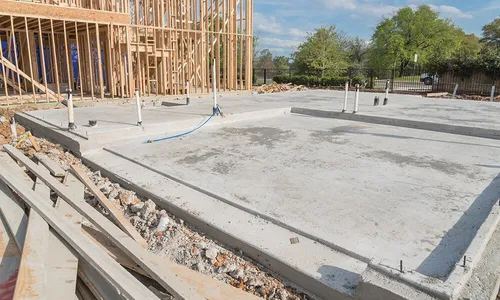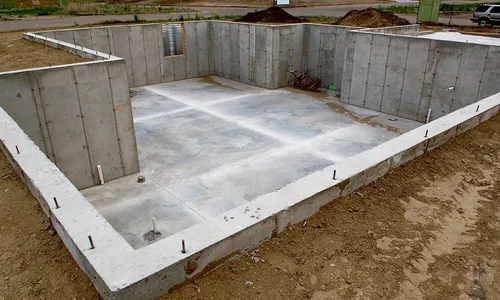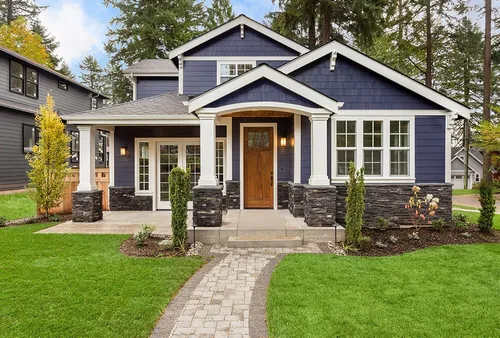Whether you’re buying, building, or selling a home, understanding the four main home foundation types for residential properties will help you get the biggest bang for your buck. Does foundation type affect daily life in a home? Does the value of your home depend on the style of concrete underneath? Luckily, at J-Tech Construction, we’re the experts in our field and this week we’re here to answer all of your burning questions about foundation types and what you need to consider when buying, building, or selling your home. This week, we’re going to start by discussing two common types of house foundations: concrete slab foundations and basement foundations.

CONCRETE SLAB FOUNDATIONS
As one of the most common foundation styles for modern homes, concrete slabs have many benefits. A concrete foundation is constructed by digging twelve inches into the ground and pouring concrete in. The concrete is then reinforced with steel beams, and the home is constructed directly on top of the slab.
Benefits: If you’re building a new home, the concrete foundation method takes less time and money than constructing a basement. Less material is used, and less labor is needed to lay the concrete. If you’re looking to buy a home and are considering your foundation styles, this type of house foundation helps fight against critters and insects since it doesn’t have many crevices for them to hide in. Additionally, concrete slab foundations are typically built closer to the ground, meaning they are more practical for homeowners with limited mobility as there will likely be fewer stairs and inclines. Plus, concrete slab foundations are generally less expensive than other types of foundations like basements or crawl spaces.
Disadvantages: If you live in the Midwest, a concrete slab foundation won’t provide much shelter from tornadoes. You’ll have to locate the nearest public tornado shelter, which will cause more stress and more risk in the case of an emergency. Additionally, since critters won’t be hiding out in your foundation, they might venture through your windows or walls to make their way inside. Finally, if tree roots, soil displacement, storms, or frozen grounds crack or warp your foundation, it will require an expensive and invasive fix.
Our take: We recommend slab concrete foundations for homeowners living in mild or predictable climates. If the weather is relatively tame year round, you won’t find yourself worrying about this foundation in the case of an emergency or in regards to the foundation cracking or warping from freezing temperatures. If you live in a state where weather is either unpredictable or ranges from extremely hot summers to freezing winters, but you want to save a quick $10,000-$15,000 when buying or building your home, we suggest finding alternative ways to save money rather than choosing an inexpensive foundation.

BASEMENT FOUNDATIONS
Unlike concrete slabs, every basement is built differently. While there are many different ways to construct a basement foundation, the two most common methods are poured concrete or concrete block basements. With poured concrete, the basement is excavated, the concrete is poured, and forms are used to keep the walls in place as they dry. These basements are durable and long-lasting with minimal upkeep requirements. When a house is built with concrete blocks, steel rebar is generally used to reinforce the walls. Concrete block basements cost a fraction of the price and can be built in a fraction of the time, but will require upkeep and are susceptible to water damage.
Benefits: The benefits of basement foundations include the added safety in storm-prone climates such as our own. Also, basements provide more living space and storage, and maximize the square footage of your home. In general, basements increase the value of your home simply by adding more space and being more attractive to homebuyers. Basements also offer a secure refuge during storms and can serve as a shelter in regions prone to tornadoes or hurricanes. If you’re able to finish your basement, expect an even larger return. Since most basements are built using the poured concrete method, they require very little upkeep.
Disadvantages: Building a basement foundation is generally more expensive than a slab foundation due to excavation and construction costs. Plus, while one of the advantages is that basements provide a cool place to hideout in your home during the summer, a disadvantage is that they don’t help when trying to keep warmth in your home during the winter. In fact, some homeowners feel they waste money on utilities by heating a basement that rarely gets used. In addition, basements can get damp, especially in times of heavy rain or melting snow. The excess humidity can lead to flooding or an influx in insects around your home. Basements may require regular maintenance to prevent mold, mildew, and other moisture-related issues. If you happen to buy a home with a concrete block foundation, you might notice reoccurring foundational issues.
Our take: The additional money spent on minimal maintenance and utilities to warm or cool your basement will end up back in your pocket when selling your home. If you live in Tornado Alley, investing in a home with a basement will give you peace of mind regarding the safety of your family. Ultimately, the extra cost is worth it, and will return down the line when selling your home.
OTHER TYPES OF FOUNDATIONS
While concrete slab and basement foundations are two of the most common, there are two other types of foundations you’ll see popping up around the housing market. Next week we’ll explore the benefits and disadvantages of both crawlspace and pier foundation types. In the meantime, if you need help with any exterior projects, call the experts at J-Tech Construction today. Here at J-Tech, we’re excited to help you achieve the results you’ve been dying to see in your home!





